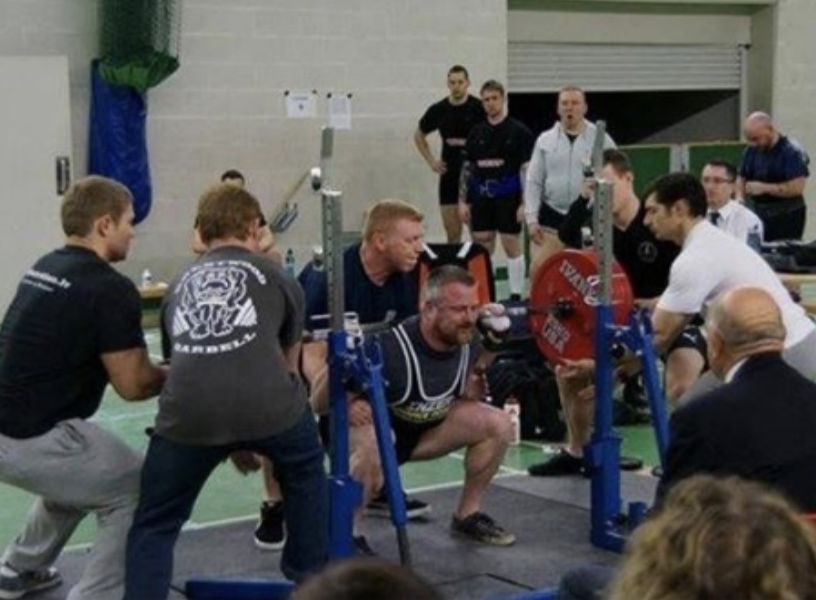Frozen Shoulder

Frozen shoulder is a common condition, affecting more women than men and mostly affecting those between the ages of 40 to 70.
It often occurs after a traumatic injury, though high stress levels and diabetes can also increase the likelihood of this condition occurring.
What is Frozen Shoulder?

Frozen shoulder is technically an autoimmune condition where the body attacks the lining of the joint capsule. The shoulder is what is known as a synovial joint. It has synovial fluid and a capsule to hold that fluid in. This is why the shoulder is such a mobile joint.
However in Frozen shoulder, or adhesive capsulitis to give it it’s correct name, that fluid becomes thick and sticky, hence the term “Adhesive”. The fluid keeps the capsule healthy, and if the fluid is compromised, the capsule becomes inflamed, hence the term “capsulitis”.
Frozen shoulder has 3 stages:
- The freezing stage, when the joint gets progressively harder to move.
- The frozen stage, when the joint is very hard to move.
- The thawing stage, when the joint starts to move again.
This process can take anything from 1- 3 years to work through.
How do you diagnose frozen shoulder?

Diagnosis can be tricky. Frozen shoulder can mimic lots of other shoulder conditions, so it is important to have a thorough assessment to rule out other shoulder conditions.
The big marker of the problem being frozen shoulder though, is that the shoulder doesn’t feel better, no matter how much strength work, massage or physical therapy interventions you do. The shoulder just doesn’t improve.
This is the time to get an ultrasound or MRI scan to confirm that frozen shoulder is occurring. Once the diagnosis is confirmed, the doctor may try a steroid injection into the joint. As this is an autoimmune condition, where the body is affectively attacking itself, this can work in some people to help it move out of the frozen phase.
How do you treat frozen shoulder?

The treatment is all around keeping the movement that the client has. We do this with targeted strength work. We also want to keep the joint as mobile as possible and we do this with soft tissue work. The technique of Myofascial Release works very well with this condition.
This hands on technique is gentle and encourages fluid back into tissues, thereby giving temporary relief to the stiffness of the shoulder.
One of the biggest issues with this condition, is that as the shoulder freezes and the arm becomes less useable, the client will then adapt to not having this arm. As a result, even once the shoulder has unfrozen, it is so weak, that to the client it still appears “frozen”. This is why it is so important to keep the movement you have and strengthen within that useable range.
With this targeted strength and loosening work, we have successfully guided our clients through much faster freeze and unfreeze processes than are often cited in the research.
Frozen shoulder needs regular treatment and this can last quite some time. So it is important to call us to discus your shoulder issue and ensure a thorough assessment occurs. This will allow us to help you manage this condition correctly.
Frequently Asked Questions about Frozen Shoulder
Frozen shoulder takes anything from 1-3 years to work through it’s phases and fully resolve.
Initially 2 to 3 sessions are needed to rule out other conditions and evaluate how you will respond to treatment.
Once Frozen Shoulder is confirmed, the optimal treatment protocol is a treatment session, with hands on work, every 2 weeks until the shoulder starts to unfreeze.
Then the strength work can take over and we would suggest monthly sessions until you have full strength back in the area.
The “frozen” stage is the most painful and difficult to manage. We have found that using, a very gentle technique, known as Myofascial Release really helps to improve the tightness and pain.
We also start you on strength work immediately, using whatever movement you have, even is this is very small.
We have found that clients who have this combination of loosening and strengthening often work through the cycle faster than the literature suggests for the condition. So to answer the question, ongoing Physiotherapy/Sports Therapy is invaluable, even when the shoulder is “frozen”.
Sports Therapists are perfectly placed to treat this condition. This is because of their hands on skills and understanding of muscle mechanics.
Every Sports Therapist is trained in Massage techniques and this condition relies on massage, as well as strengthening. They are able to gently relieve the stiffness and then evaluate how your muscles are working. Allowing them to tailor your exercises to get the best result.
In some cases where a steroid injection is used very early in the process, while the shoulder is “freezing” , a steroid injection can be an effective treatment option.
Symptoms can resolve within a few days and can last for weeks or months.
Where the shoulder has become fully frozen, steroid injections appear to be less affective. As this condition can often take a while to be diagnosed, many people miss the early stages, assuming it is something else, and therefore the window is missed.
However, it is well worth trying a steroid injection, especially if the symptoms are becoming unmanageable, as it may be effective.
The NHS have some useful information on Frozen Shoulder, which you can view here.
What Our Clients Say About Us?
Francis Butt
September 20, 2022
As always, brilliant evaluation, treatment and strategy. Thanks Ian!
Claire Kelley
October 10, 2022
Ian is brilliant at really working to solve the problem. He doesn't rush to get you back but gives you time for set exercises to work and then reassess. Would definitely recommend
Zoe Statters
October 20, 2022
Always upbeat, friendly, offers useful advice & service is always top notch, suggestions and treatments that actually work!
Matt Morrisey
December 8, 2022
EXCELLENT , HELPED ME UNDERSTAND ALL MY ISSUES AND HOW TO START TO RE AJUST
Sonia Chamberlain
September 5, 2023
Gina is a brilliant therapist! Very friendly, supportive and provides a holistic approach to MSK problems.
Megan Thomas
September 5, 2023
Very professional assessment and recommended remedial action that generated far better results than expected. I am as good as new, great work Gina!
Katie Silverthorne
September 5, 2023
Gina is an absolutely marvel! I had incredibly painful and chronic shoulder pain that had been causing serious issue for over 2 years. I had been to lots of different practitioners - with no luck. Happily Gina set me right! I couldn’t be happier. ????
Wynford Dore
September 5, 2023
I needed the pain to go away....yet had discovered in recent years that not all physios are equal! So I put more effort into finding one that was good - and subsequently went to Gina at The Reinge Clinic. Bottom line .... the pain has completely gone - she seemed to know quickly where the root cause of the problem was hiding, and addressed it. Only took 3 sessions - I had expected it to take far longer. Huge thanks.
Sarita Bhardwaj
September 5, 2023
Gina was very informative, patient and she successful in completely eliminating my shoulder and arm problems - Thank you so much!
Angela Tadd
September 5, 2023
I went to Ian after with a chronic condition, diagnosed as compression whiplash. Ian offered great advice and also explained how this was affecting me. It helped considerably to understand the issue and why these exercises were so important particularly in relation to my posture. I needed a few appointments as I also developed a frozen shoulder. Ian was extremely supportive and offered friendly guidance, amending the exercises as the symptoms changed along the way. I would highly recommend the Reinge Clinic.
Rob Wilding
September 5, 2023
I went to Gina at Reinge with ongoing shoulder issues. Due to past experiences I was skeptical of physio work, but Gina was fantastic: patient, friendly, and put's everything in layman's terms so I could actually understand what was actually going on. She also identified a long-term undiagnosed issue (which many other 'specialists' have failed to even note before) within one session. After a few sessions, my shoulder is improving! Highly recommend to anyone.

Lesley Hudswell
September 5, 2023
You don’t need to be sporty to benefit from seeing a Sports Therapist. Gina is helping me correct bad habits that started with my shoulder surgery decades ago. It’s tough when she tells you how many things are wrong but amazing when they start to come right. I’ll never be sporty, and don’t want to be, but I have much more energy and better quality of life since she started sorting me out.

Steve Sprange
September 5, 2023
I’m no spring chick, all but 50 now but still compete at an international level in powerlifting. Not a common sport but none the less very competitive and to my name have numerous British, European and World records. However, unlike the younger lifters, when I hurt myself, which I inevitably do, I don’t get over it in a day and need assistance, rehabilitation and exercises. So far I have always been able to be fixed, and my biggest mistake; not seeing Ian or Gina straight away inevitably delaying the fixing process. So whether you are a sports person, or suffering with pain or mobility don’t put it off. The sooner you see Ian or Gina the sooner you will be on the road to recovery.

Mike Perrott
September 5, 2023
I am an outdoor activities instructor and coach specialising in canoeing and kayaking so I need to fit and active enough to look after my clients. Ian has kept me mobile on several occasions following back problems and a frozen shoulder. After these emergency interventions he has provided exercise regimes to completely restore movement and strengthen the weakened areas to help prevent recurrence. I can now try any canoeing or kayaking I wish without fear of hurting myself again. Not bad when I have, at times, despaired at times of continuing in the sport I love.